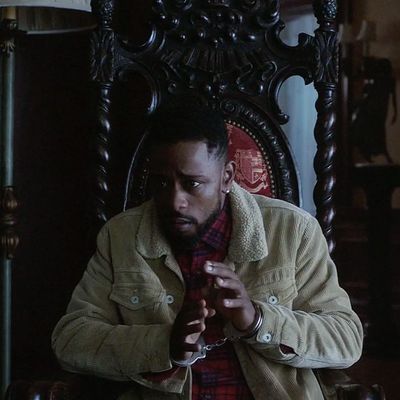
I don’t think there is any episode of Atlanta I have said “what the hell?!” to, with a mix fear and curiosity, more than “Teddy Perkins.” Scant details were available about the episode before it aired. It was poised to run for over 30 minutes without any commercials and would be centered on the exceedingly chill, unflappable Darius (Lakeith Stanfield). Viewers benefit from coming in cold to “Teddy Perkins.” What makes it so memorable is how it works on multiple levels, offering different readings about a host of issues — from familial abuse to black artistry that is wrought from pain — nestled in a stunning, self-contained horror film.
The thrust of the episode — impeccably directed by Atlanta mainstay Hiro Murai, who blends a variety of influences, including horror films like What Ever Happened to Baby Jane?, The House of the Devil, The Texas Chainsaw Massacre, and Creep — concerns Darius’s foolhardy decision to pick up a piano with rainbow keys for free from a complete stranger outside of the city. As he rolls up to the palatial but worn mansion in his rented U-Haul, it is clear what was planned as a simple pickup will unfurl into something else entirely.
The stranger in question is Teddy Perkins, played by Donald Glover in masklike whiteface, and he gives viewers the sort of creeping unease that defines the best horror villains. Teddy’s oddly inhuman face is only part of what makes him feel off. He has the sort of eccentricities that Billy Wilder memorably skewered in Sunset Boulevard. He eats soft-boiled ostrich eggs with a pained slowness that ups the ick factor; watches old home footage of his abusive father, for whom he’s also created a museum to honor him; and has a gift shop for his talented piano-playing brother, Benny Hope, who collaborated with such luminaries as Al Jarreau. Darius theorizes that Teddy is Benny Hope, and that he created an alter ego out of shame for his identity-warping plastic surgery, even after he meets Benny in the basement swathed in bandages and rolling in a wheelchair. As the episode continues, it blooms into full-blown horror that closes on a violent finish.
Darius’s dedication to getting this rainbow-keyed piano proves to be potentially fatal when Teddy turns a rifle on him. “Congratulations. I choose you. You’re my sacrifice,” Teddy says, his glassy eyes wide with fevered hope. Teddy trains his gun on Darius, leading him down the stairs, forcing him to handcuff himself. What I keep coming back to about this ending is how the emotional terrain continues to shift. Darius is obviously terrified. But Lakeith Stanfield also brings touches of sorrow to his performance, making it clear he empathizes with Teddy for the pain of his childhood, so fiercely controlled by an abusive father he now idolizes. “Not all great things come from great pain. Sometimes it’s love,” Darius says. “But your dad should have said sorry. I’m sorry. I went through daddy shit myself.” Darius opens up about the warping effects of inherited trauma and abuse, which momentarily seems to touch Teddy, perhaps coaxing him out of his desire to kill. Ultimately, Teddy doesn’t agree. The sacrifice and pain must be necessary, because if it isn’t, the rigors of his childhood grow more harrowing. It makes his abuse, in his mind, meaningless; simply the act of a cruel man rather than a loving father. In the next moment, Benny rolls into the room in his wheelchair; Teddy spins around, gobsmacked to see his brother still alive, and the episode erupts into violence. Benny grabs the gun, killing Teddy and then himself.
The episode is riddled with Stevie Wonder references, with his music used to open and close the show. It ends with “Evil” from his 1972 album Music of My Mind. “Evil, why have you engulfed so many hearts, evil / Evil, why have you destroyed so many minds / Leaving room for darkness, where lost dreams can hide,” Wonder sings. In the context of this episode, the song seems to nod to inherited trauma that has been passed down from father to son, defining Teddy’s worldview. By these final moments, it’s obvious that Teddy had already made the decision to follow his father’s example by abusing the ailing Benny. It isn’t merely pain, but a choice to give in to evil and present it as a necessity of life. Wonder is also referenced by Darius when he advises Teddy that he doesn’t have to continue what his father started, choosing abuse over love. What makes “Teddy Perkins” the best episode of this already glorious sophomore season is how it critiques the idea that great art must always be born of great pain, and allows for glimmers of empathy and hope to shine through.


